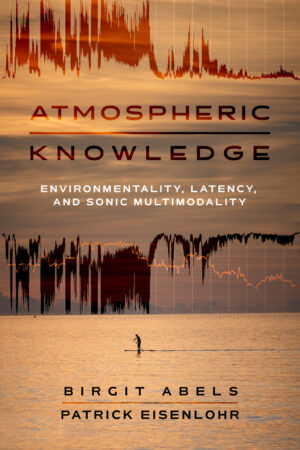Knowing Through Atmospheres
By Birgit Abels and Patrick Eisenlohr, authors of Atmospheric Knowledge: Environmentality, Latency, and Sonic Multimodality
What if knowledge, as many Indigenous ways of understanding the world suggest, could be felt, not just thought? In our book Atmospheric Knowledge: Environmentality, Latency, and Sonic Multimodality, we invite readers to rethink how humans know the world through sound, affect, and atmosphere from our combined perspectives of musicology and anthropology. Drawing from fieldwork across the Indian Ocean to the Western Pacific, we explore how understanding emerges not only from discourse or reason, but from being moved—literally and emotionally—by the vibrations, sounds, and ambiences that surround us.

At the heart of our book is the question: how can being affected by an atmosphere produce knowledge? From the phenomenological perspective we take in our book, atmospheres are not just moods or background feelings; they are dynamic, sensory environments that shape how people experience and understand their worlds. Drawing on phenomenologists including Hermann Schmitz and Gernot Böhme, we describe atmospheres as “emotions poured into space”. Atmospheres, we argue, form the bridge between lived bodies and environments, they are the site where the two intermingle. Through atmospheres as such a bridge and site of intermingling of felt bodies and the world, people sense meaning, belonging and movement.
Through the book’s ethnographic scenes, Atmospheric Knowledge explores how this works in practice. In Palau, Birgit Abels encounters chanting and song as ways of knowing the ocean: sonic performances that turn the sea from a vast space into a living network of relations. In Mauritius and also in Mumbai, Eisenlohr listens to Muslim devotional poetry in Urdu, where the voice itself—its tone, rhythm, and vibration—conveys piety and connection across the Indian Ocean. In both cases, the sonic becomes a vehicle for transoceanic knowledge: a means of sustaining histories and ways of belonging through resonance.
In the book we draw relations between atmosphere and several other theoretical notions to describe these processes. Concepts including transduction (the emergence of distinct entities out of an inchoate milieu), latency (the sense of knowledge that something is about to manifest), and environmentality (the entanglement of humans and their surroundings) help us map a world where knowing is multisensory and emergent. We challenge conventional notions of cognition, proposing that sound-based practices generate “atmospheric knowledge”—a form of embodied, pre-verbal understanding that ties people to place, history, and community.
Both of us also see atmosphere as deeply political. Whether in religious rituals, environmental activism, or architecture, the crafting of atmospheres shapes how people feel collective belonging and ethical responsibility. Sound as a sensory phenomenon is also a medium of citizenship, spirituality, and ecological attunement. The book’s closing chapters link chanting and climate change, suggesting that sonic and atmospheric sensibilities might offer new ways of thinking about planetary futures.
As an academic intervention, Atmospheric Knowledge aims to bundle insights from anthropology, musicology, and philosophy. For us, the book asks us all to listen differently: to hear how vibration, resonance, and rhythm become ways of knowing and caring for the world. For anyone interested in sound, environment, or the affective dimensions of knowledge, we hope our book offers an alternative framework for thinking about what it means to live—and learn—through atmosphere.
Birgit Abels is Professor of Cultural Musicology at the University of Göttingen and author of Music Worlding in Palau and Sounds of Articulating Identity.
Patrick Eisenlohr is Professor of Anthropology at the University of Göttingen and author of Sounding Islam and Little India.
A free ebook version of this title is available through Luminos, University of California Press's Open Access publishing program. Visit www.luminosoa.org to learn more.